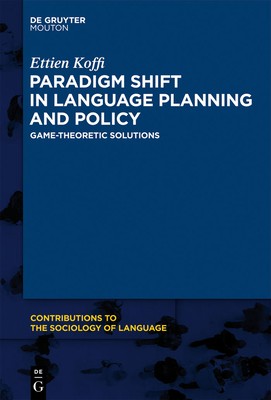
- We will send in 10–14 business days.
- Author: Ettien Koffi
- Publisher: Walter de Gruyter
- Year: 2012
- Pages: 328
- ISBN-10: 1934078107
- ISBN-13: 9781934078105
- Format: 15.8 x 23.4 x 2.5 cm, hardcover
- Language: English
- SAVE -10% with code: EXTRA
Reviews
Description
The book proposes a paradigm shift in language planning and language policy in Africa. For the past fifty years, the dominant model has been the hegemonic model whereby a language of wider communication (LWC) is imposed on minority languages. It is now time for a paradigm shift in favor of a more egalitarian model in which all the languages spoken in the same country, irrespective of their size, are planned. The paradigm shift concerns four critical areas: status planning, cost-benefit planning, acquisition planning, and corpus planning.
Such a shift is justified for the following reasons: First, the hegemonic model has a dismal track record of success in Africa and elsewhere. Second, the hegemonic model exacerbates linguistic conflicts in many countries. Consequently, policy makers shun it for fear of jeopardizing the fragile social fabric in their respective countries. Last, a shift away from the hegemonic model is recommended because it is too costly to implement. The "democratic model" is undergirded by the Strategic Game Theory proposed by David Laitin. It forecasts a 3±1 language outcome for most African countries. This outcome supports the "three language formula" now called for by the United Nations Development Program (UNDP).
EXTRA 10 % discount with code: EXTRA
The promotion ends in 17d.18:28:53
The discount code is valid when purchasing from 10 €. Discounts do not stack.
- Author: Ettien Koffi
- Publisher: Walter de Gruyter
- Year: 2012
- Pages: 328
- ISBN-10: 1934078107
- ISBN-13: 9781934078105
- Format: 15.8 x 23.4 x 2.5 cm, hardcover
- Language: English English
The book proposes a paradigm shift in language planning and language policy in Africa. For the past fifty years, the dominant model has been the hegemonic model whereby a language of wider communication (LWC) is imposed on minority languages. It is now time for a paradigm shift in favor of a more egalitarian model in which all the languages spoken in the same country, irrespective of their size, are planned. The paradigm shift concerns four critical areas: status planning, cost-benefit planning, acquisition planning, and corpus planning.
Such a shift is justified for the following reasons: First, the hegemonic model has a dismal track record of success in Africa and elsewhere. Second, the hegemonic model exacerbates linguistic conflicts in many countries. Consequently, policy makers shun it for fear of jeopardizing the fragile social fabric in their respective countries. Last, a shift away from the hegemonic model is recommended because it is too costly to implement. The "democratic model" is undergirded by the Strategic Game Theory proposed by David Laitin. It forecasts a 3±1 language outcome for most African countries. This outcome supports the "three language formula" now called for by the United Nations Development Program (UNDP).


Reviews